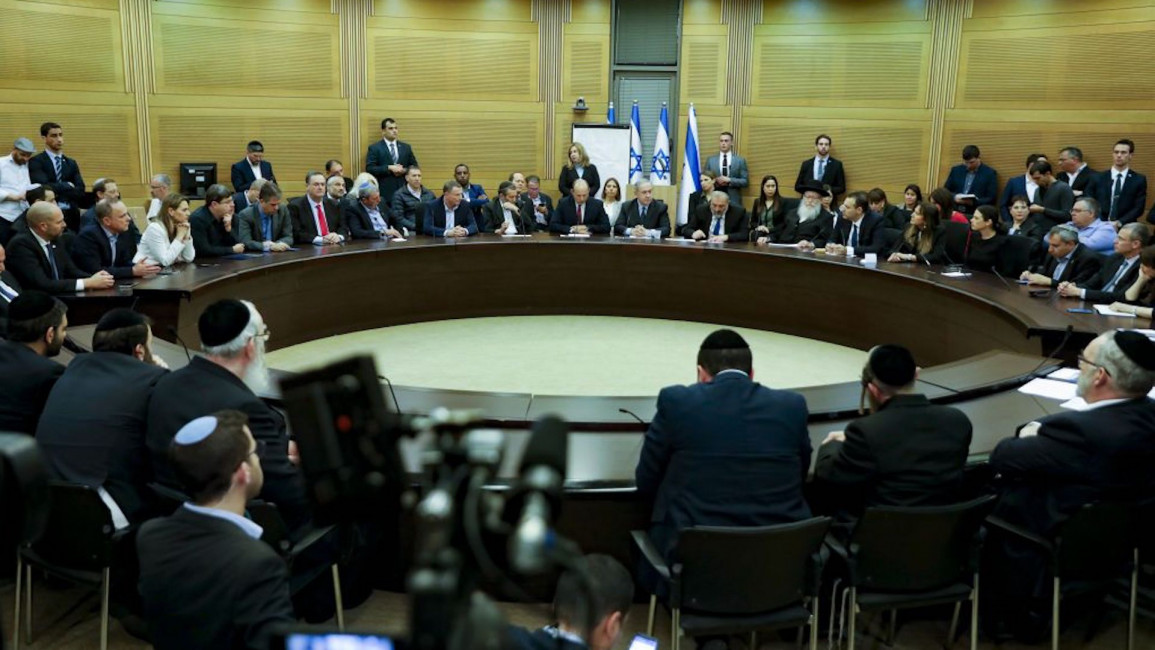Israel's parliament will have fewer powers to oversee government's coronavirus response
Israel's parliament will have fewer powers to oversee government's coronavirus response
There are concerns about further erosion of parliamentary powers in Israel.
2 min read
The Israeli parliament will see reduced oversight powers [Getty]
Israel's parliament will have reduced powers in overseeing the government's response to the coronavirus crisis, after a vote passed in the Knesset on Thursday that has sparked fears about the health of democracy in the country.
The Knesset approved the "Grand Corona Law" by a vote of 48-35, which grants government the power to implement measures - such as lockdowns - without parliamentary approval.
Lawmakers would only be able to oversee the new decisions after 24 hours sparking fears that the law will weaken the power of the parliament and further erode Israeli democracy.
"No democracy in the world would agree to cancel out its own parliament," tweeted centrist opposition MK Yoel Razvozov, who branded the new law "fascistic and dictatorial", according to Reuters.
The Israeli government, headed by Prime Minister Benjamin Netanyahu, argues that the Grand Corona Law is necessary to effectively tackle the disease.
"Do you have any doubt that we will not be able to stop the coronavirus spread without the ability to make quick, difficult, clear-cut decisions like we did during the first wave?" said Internal Security Minister Amir Ohana, according to Reuters.
Israel has seen a recent rise in coronavirus cases which has led to anger about the government's response.
While strict lockdown measures imposed in March helped control the disease, Netanyahu allowed the Israeli economy to reopen in late April and early May, leading to a rise in the infection rate.
Netanyahu is charged with fraud, breach of trust and accepting bribes in a series of scandals in which he is alleged to have received lavish gifts from billionaire friends and exchanged regulatory favours with media moguls for more agreeable coverage of himself and his family.
The prime minister's convictions - which will see him standing trial while in office - have led to protests against his leadership.
The Knesset approved the "Grand Corona Law" by a vote of 48-35, which grants government the power to implement measures - such as lockdowns - without parliamentary approval.
Lawmakers would only be able to oversee the new decisions after 24 hours sparking fears that the law will weaken the power of the parliament and further erode Israeli democracy.
"No democracy in the world would agree to cancel out its own parliament," tweeted centrist opposition MK Yoel Razvozov, who branded the new law "fascistic and dictatorial", according to Reuters.
The Israeli government, headed by Prime Minister Benjamin Netanyahu, argues that the Grand Corona Law is necessary to effectively tackle the disease.
|
|
Israel has seen a recent rise in coronavirus cases which has led to anger about the government's response.
While strict lockdown measures imposed in March helped control the disease, Netanyahu allowed the Israeli economy to reopen in late April and early May, leading to a rise in the infection rate.
The prime minister's convictions - which will see him standing trial while in office - have led to protests against his leadership.


![President Pezeshkian has denounced Israel's attacks on Lebanon [Getty]](/sites/default/files/styles/image_684x385/public/2173482924.jpeg?h=a5f2f23a&itok=q3evVtko)



 Follow the Middle East's top stories in English at The New Arab on Google News
Follow the Middle East's top stories in English at The New Arab on Google News


